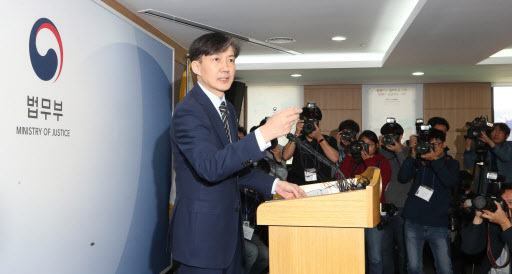Embattled Justice Minister Cho Kuk laid out measures to reform the prosecution Tuesday, proposing to curb its power for direct probes and better protect human rights during investigations.
Cho, whose family is under investigation over corruption allegations, made the announcement during his first press briefing since taking office last month, stressing the public’s call for prosecution reforms.
The reform measures came as Cho’s wife, Chung Kyung-shim, was summoned for questioning for the third time over her alleged involvement in committing academic fraud and making shady investments. His brother, Cho Kwon, is also awaiting a court’s decision on his arrest warrant.
As part of the reform measures, the prosecution’s special investigation units will be abolished, except for three major ones. The elite squads of experienced prosecutors charged with investigating high-profile corruption cases have been criticized for being politically motivated.
The scope of prosecutors’ direct investigations will be limited as their dispatch outside the prosecutions offices will be kept to the minimum. The role of units on criminal probes and trial-related affairs will also be expanded.
The measures reflect much of what Prosecutor General Yoon Seok-youl has already sought to do to overhaul the law enforcement agency, with a focus on curbing the authority of the prosecution and improving controversial investigation practices.
 |
(Yonhap) |
In Korea, the prosecution has been criticized for holding too much power by monopolizing the right to indict suspects and close investigations.
To ensure protection of human rights during investigations, the length of questioning sessions will be limited to eight hours, while late-night questioning and public summoning will be banned, and in-person questioning will be minimized.
Vehicles exclusively used by senior prosecutors will no longer be available, and the Justice Ministry’s surveillance into the prosecution and its administrative operation will be strengthened, according to the measures. The ministry oversees personnel and administration of the prosecution.
Cho said the measures will come into effect within the year.
In the long term, the Justice Ministry will be free from the influence of the prosecution by filling its senior positions with people who have no related experience.
The Moon Jae-in administration has pushed for judicial reforms as part of its campaign pledge amid criticism that prosecutors are politically biased to serve their own interests.
A set of bills on judicial reforms -- including the creation of an independent body tasked with probing corruption allegations involving high-ranking government officials as well as giving more investigative power to the police -- were fast-tracked in April, but are pending at the National Assembly.
The ruling Democratic Party and the opposition bloc agreed on Monday to open discussions again on passing the bills.
The measures also came amid an apparent power struggle between the Justice Ministry and the prosecution, with both sides unveiling measures to revamp the prosecution in a seemingly competitive manner.
Prosecutor General Yoon Seok-youl has also set out a series of measures -- such as the abolition of special investigation unites and prohibiting public summoning -- in the past week while speeding up a probe into Cho’s family.
The prosecution’s investigation has divided the country, leading both those supporting and opposing the Moon administration to take to the streets.
Supporters of Cho have held candlelight vigils in southern Seoul, calling for a thorough reform of the prosecution and denouncing it as politically charged, while the opposition bloc has demanded Cho’s impeachment over the corruption allegations.
(
laeticia.ock@heraldcorp.com)








